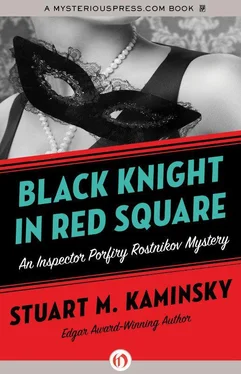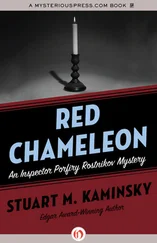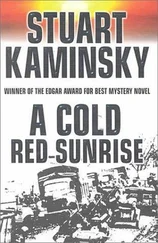Stuart Kaminsky - Black Knight in Red Square
Здесь есть возможность читать онлайн «Stuart Kaminsky - Black Knight in Red Square» весь текст электронной книги совершенно бесплатно (целиком полную версию без сокращений). В некоторых случаях можно слушать аудио, скачать через торрент в формате fb2 и присутствует краткое содержание. Год выпуска: 1983, ISBN: 1983, Издательство: Fawcett, Жанр: Полицейский детектив, на английском языке. Описание произведения, (предисловие) а так же отзывы посетителей доступны на портале библиотеки ЛибКат.
- Название:Black Knight in Red Square
- Автор:
- Издательство:Fawcett
- Жанр:
- Год:1983
- ISBN:9780804104050
- Рейтинг книги:5 / 5. Голосов: 1
-
Избранное:Добавить в избранное
- Отзывы:
-
Ваша оценка:
- 100
- 1
- 2
- 3
- 4
- 5
Black Knight in Red Square: краткое содержание, описание и аннотация
Предлагаем к чтению аннотацию, описание, краткое содержание или предисловие (зависит от того, что написал сам автор книги «Black Knight in Red Square»). Если вы не нашли необходимую информацию о книге — напишите в комментариях, мы постараемся отыскать её.
Black Knight in Red Square — читать онлайн бесплатно полную книгу (весь текст) целиком
Ниже представлен текст книги, разбитый по страницам. Система сохранения места последней прочитанной страницы, позволяет с удобством читать онлайн бесплатно книгу «Black Knight in Red Square», без необходимости каждый раз заново искать на чём Вы остановились. Поставьте закладку, и сможете в любой момент перейти на страницу, на которой закончили чтение.
Интервал:
Закладка:
“I can give no such assurance for the soldiers,” he said, taking another step toward her.
The young couple who had been examining the Place of Execution moved past the woman, talking to each other, ignoring the conversation between her and the tall, cadaverous man.
“There is no place for you to run, Louise Rich,” he said.
His use of the name stung, and the woman shook her blond hair out of her eyes.
“That’s not my name,” she said.
“I didn’t think it was,” said Karpo.
“But you know about my flight reservation,” she said, “and the identity I’ve been using.”
“And so,” Karpo said softly, since he was close enough, “your options are gone.”
“Limited,” she corrected, “but not gone.”
“Perhaps,” he said with a shrug.
A draft of wind came across Red Square behind Karpo, blowing the woman’s hair back and creating an image of her against the background of the Cathedral of Saint Basil the Blessed that drilled itself into Karpo’s mind. At this moment, bomb in hand, facing this enemy of the state, he felt an emotion he wanted to deny but couldn’t. Determined in the face of certain defeat, she looked quite beautiful.
“How did you find me?” she said quietly in a voice that matched his own as she looked over at the soldiers.
“Reason, a process of elimination, and a little luck,” he admitted.
Her eyes were on him, her lips pale. He considered turning away, recalling a faint childhood image of Medusa, but he kept his gaze steady.
“We are alike,” she said through clenched white teeth.
And Karpo realized that in some way she was correct and that he stood here now looking at an important aspect of himself which, until this moment, he had denied. The realization shocked him.
“In some ways,” he said.
“You won’t back away, will you?” she said with admiration.
“I can’t,” he said.
“In a moment or two that soldier will raise his rifle and shoot me,” she said, nodding beyond Karpo. “You know that.”
“Yes,” he said.
“And what would you do in my place?” she asked.
Karpo was silent.
“What is your name?”
“Karpo, Emil Karpo. And yours?”
“That,” she said with a grin, “you will never know.”
Karpo felt a surge within and about him, an explosion of love, regret, and death as he leapt toward the stone platform.
Roman Tibiliski was standing across from the State History Museum at the far end of Red Square seven hundred yards from the Place of Execution. He was telling his co-manager from the Gdansk Steel Mill that the building they were looking at was the headquarters of the KGB, which was as wrong as one could be about a building, but Tibiliski, at the age of sixty, was a massive, confident man with a gruff, assured style that usually masked his ignorance.
He had just turned to Waclaw Wypich, his co-manager, to add a few erroneous details to his description when the explosion occurred. He found himself looking directly at the flash of red, followed almost instantly by a whooshing sound and a ball of smoke.
Tibiliski had no idea what the explosion was, but he felt that he ought to explain it. “Look,” he shouted to Wypich, “the fireworks. The Sunday fireworks in Red Square. They’ve begun early.”
Wypich, who believed almost nothing his older co-manager said, nodded knowingly, which was his means of getting through life minimally scathed.
“Shall we take a look?” Wypich asked.
Tibiliski could now see the rushing of soldiers and the scurrying of people in the crowd. It dawned on him that he had been quite mistaken about the cause of the explosion.
“No,” he said knowingly, “it’s not worth looking at. Let’s move on into October Square and have a look at the Sports Palace.”
The major, who had been more than fifty yards away when the explosion came, had been knocked backwards and lifted into the air. He had struck the soldier behind him, whose bayonet pierced the major’s right arm.
The lieutenant was ten yards farther back, gently but insistently urging bystanders to move away from something they could neither see nor understand. He felt only the warm blast and turned to see the smoke.
His first act was to go to the major, who lay wounded. Beyond the immediate scene tourists and visitors were running, screaming, or standing in confusion. As far as the lieutenant could tell, no one except the major was seriously injured unless, of course, one counted that mad-looking woman with the camera and the policeman named Karpo. The woman was quite dead. Karpo was a bloody blot huddled against the platform; however, he was still breathing.
FIFTEEN
“Karpo has been injured. He may be dying,” said Tkach, putting down the telephone and turning to his wife.
Maya looked at her husband’s pale face and knew that he was about to collapse. She took his arm and eased him into a chair.
He had come home from the hospital and immediately assured her that he was all right, that he had escaped with a few stitches and a slight shock, but now a second shock, a more profound one, had hit him.
“It could have been me,” he whispered. “It was a bomb, a bomb like the one…”
He let his voice trail off and looked at her for an answer but she didn’t have one. Fortunately, his mother was sleeping in the other room when the call came just before midnight on Sunday.
“It could have been me,” he repeated.
“Yes,” said Maya, “but it wasn’t.”
He had turned on the light in the room to answer the phone, and now the dim yellow glow on her face and in the corners of the room frightened him and she knew it.
“Maya,” he said looking at her.
“I know,” she answered.
“Karpo,” he said.
“Do you want to tell me what happened?” she asked, not wanting to hear about it but knowing it would help him to talk.
“Not now,” he said, brushing his straight hair back like a little boy. “Maya, if we have a boy, we will call him Emil.”
“Yes,” she agreed, knowing they would do no such thing, “we will call him Emil.”
It took them an hour to get back to sleep, but sleep they did.
Anna Timofeyeva lay in her bed at midnight unable to see in the darkness but quite able to hear the breathing of the woman in the bed next to her and the snoring of the woman across from her.
No one had told her about what had transpired, for the doctors had given specific instructions that she was not to be excited. In fact, she was supposed to be asleep at this very moment. They had given her a pill to make her sleep, but they had not accounted for the determination of Anna Timofeyeva.
She had always considered sleep a waste of time that she could use to perform productive work. She worked well at night, in the moments just before sleep. At home she kept paper at her bedside to write down ideas about cases that she worked out in the darkness with Baku snuggled against her leg.
Rostnikov had assured her that the cat was taken care of, and the doctor had assured her that, with caution, she could return home and resume a limited work schedule after proper treatment. She would undergo that new rehabilitation technique for heart attack victims, learned from a South African who had defected to the Soviet Union. The South African would work with her himself.
Anna Timofeyeva was eager to get back to work. She could not think in this bed, could not think in bed without the cat, could not think with these hospital noises and the pill she was fighting.
She had faith in Rostnikov, she told herself, but there had been something in his tone, his movement. He’d held something back when he visited her. But she must have been mistaken. It must be the illness, the medication. Rostnikov would not hide anything from her.
Читать дальшеИнтервал:
Закладка:
Похожие книги на «Black Knight in Red Square»
Представляем Вашему вниманию похожие книги на «Black Knight in Red Square» списком для выбора. Мы отобрали схожую по названию и смыслу литературу в надежде предоставить читателям больше вариантов отыскать новые, интересные, ещё непрочитанные произведения.
Обсуждение, отзывы о книге «Black Knight in Red Square» и просто собственные мнения читателей. Оставьте ваши комментарии, напишите, что Вы думаете о произведении, его смысле или главных героях. Укажите что конкретно понравилось, а что нет, и почему Вы так считаете.












